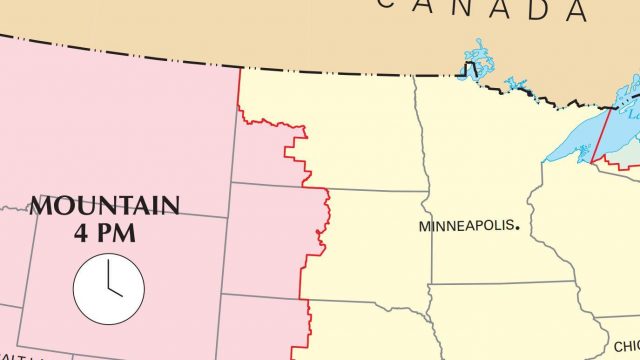North Dakota Isn’t Going to Change Its Time Zones

SAB readers will remember that North Dakota’s 2017 legislative session included a debate over time zones. SB2167 that session would have ended daylight savings time in our state, and moved the entire state into the central time zone.
It failed in the state Senate on a 11-33 vote with no debate.
In the 2019 session we have a new bill, this time originating in the state House. State Rep. Jim Kasper has introduced HB1486 which, if passed, would put the entire state in the central time zone:

I suspect Rep. Kasper’s bill will see about as much success as SB2167 did last session, and there are a lot of reasons for it.
For one thing, all of the sponsors of this legislation live in the Central Time Zone. The zone to be imposed on the 11 counties in the southwest part of the state which are currently in the Mountain Time Zone. If the folks there wanted a change, you’d think they’d be the ones calling for it. In fact, in the not so distant past, they’ve specifically rejected the idea. “Both Billings and Stark county voters in 2010 shot down a proposal to switch to Central time that was introduced by a Dickinson city commissioner,” my colleague Austin Howard reports.
What’s more, if anything, most of North Dakota should be in the Mountain Time Zone. The boundary between the Central and Mountain time zones was originally the 97.5 parallel, which runs north and south through the state about 40 miles west of Fargo. As the Bismarck Tribune reported back in 2017, it was political gerrymandering mostly lobbied for by the railroads which was the genesis for our oddball time zones today.
But would there be political support for restoring the old time zone? It seems unlikely that we’d put Valley City and Fargo on different time zones. Or, if we opted to push Mountain Time to the border with Minnesota, to have Fargo and Moorhead operating on a one-hour differential from each other.
I suspect we’re going to maintain the status quo. Only about 65,000 North Dakotans live in the Mountain time zone, which is less than 10 percent of our population. North Dakotans in the rest of the state aren’t much impacted by it, and those that are seem to mostly want to stay on Mountain time.




